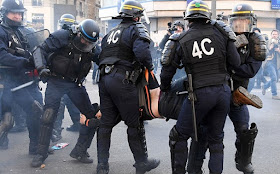 |
| Anti-riot police restrain a protestor during a demonstration against police brutality on Feb. 18, 2017 on the place de la Republique in Paris, France. (AFP Photo) |
French National Police began on Monday a 12-day training
on crowd control for The Gambia’s anti-riot Police Intervention Unit (PIU).
Gambia’s Office of National Security (ONS) said the
training on “public order tactical applications” is a part of the country’s
broad ongoing security sector reforms.
French
police have been accused of maiming peaceful protesters by its own crowd
control tactics – in crackdowns on “yellow vest”
and other protesters in France.
“French police used crowd control and anti-riot tactics during
demonstrations in Paris in November and December 2018 that caused physical harm
to peaceful demonstrators,”
rights violations monitoring group, Human Rights Watch (HRW), said.
HRW said peaceful
protesters who suffered from the brutal actions of the French police included
high-school students, and journalists.
Laws forbid excessive
use of force
Forty
(40) PIU officers including Platoon and Section Commanders, are to benefit from
the training which involves taking modules on discerning critical operational
situations, analyzing the environment and giving proper orders to troops, the
National Security Advisor, Col. (Ret.) Momodou Badgie, said in a statement.
“This
is the first training to be undertaken by the French-Gambia Cooperation towards
applying the principles of good governance to security provision, management
and supervision in a democratic context,” Badgie said.
 |
| French Police in Marseille arrest a yellow vest protesters covered in blood (AFP Photo) |
“Principles
for Security Sector Governance include effectiveness, efficiency,
accountability, transparency, responsiveness and the rule of law.”
Gambia’s
PIU is notorious for brutally cracking down on peaceful protesters and has used
life ammunition leading to the killing of several protesters – the most recent,
in June 2018, led to the killing
of three environmental activists.
“The
training is very important for PIU officers… the laws of The Gambia forbid the
security excessive use [of] force,” Badgie said on Monday.
The
first week of training focuses on elementary maneuvers, movements and tactics,
while the second week focuses on operational reasoning and command.
History
of brutality
HRW said it documented cases of wounds (head and neck injuries)
caused by direct hits with rubber ball-shaped projectiles shot out of a
specialized launcher known as “flashballs”.
It also documented burns
and physical injury to limbs from the use of supposedly less-than-lethal
tear gas grenades which contain a small, secondary explosive charge; and
questionable use of tear gas delivered as a spray.
France has a history
of brutally cracking down on peaceful protesters.
In 2017, rights groups and victims’ families held
a rally in Paris against police
brutality as tensions rose over alleged beatings and deaths in police custody.
As
many as 200
Algerians who were protesting for independence were
slaughtered by French police on the streets of Paris on October 17,
1961.
Under pressure
Under pressure
Adama Barrow's government faces increasing pressure from activists to respect a three-year transition programme contained in the Coalition 2016 Manifesto.
Last month, 15 members of "Operation Three Years Jotna", a pressure group calling for President Barrow to step-down in December, were arrested at a peaceful protest in Kololi, a small town west of the capital, Banjul.
More peaceful protests are expected by year's end as sections of society are said to be unhappy about some government policies.
The police have also on several occasions restricted peaceful protests by refusing to issue permits and occupying protests grounds.
The right to hold peaceful protests is provided for by Gambian and international law.
In September 2018, President Adama Barrow threatened to take action against growing public dissent against his government.
“Enough is enough,” he said upon his return from the UN General Assembly in New York, according to the blog, She Is The People.
Written by Modou S. Joof
Follow on Facebook: The North Bank Evening Standard
No comments:
Post a Comment
The views expressed in this section are the authors' own. It does not represent The North Bank Evening Standard (TNBES)'s editorial policy. Also, TNBES is not responsible for content on external links.